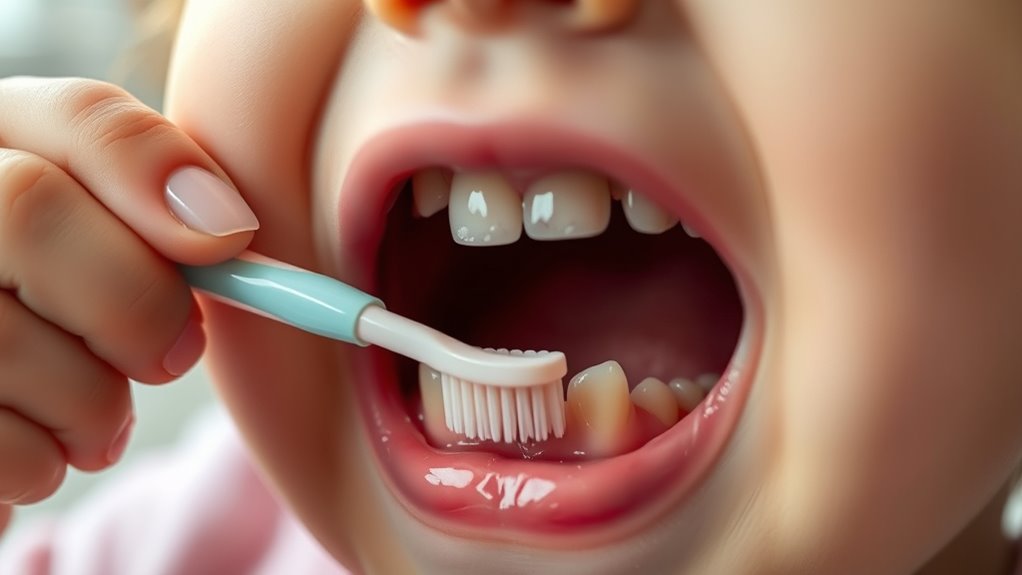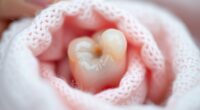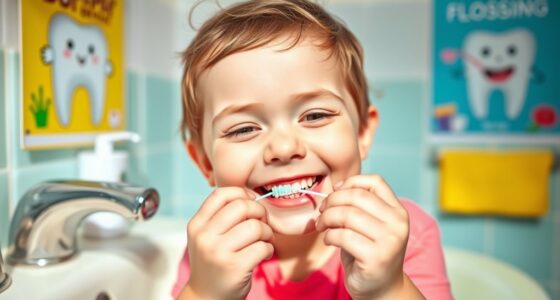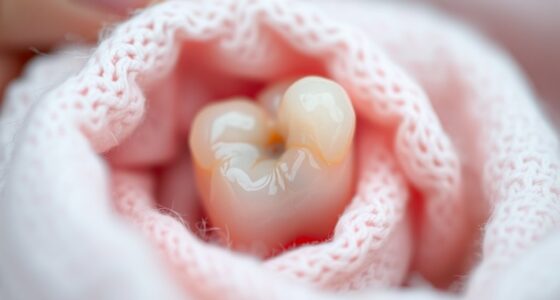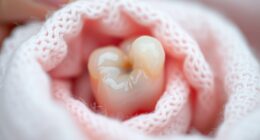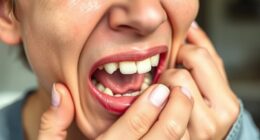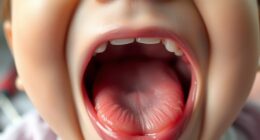To care for your child’s baby teeth, start gentle cleaning as soon as gums appear, using a damp cloth or soft brush. Establish a consistent routine of brushing twice daily with age-appropriate fluoride toothpaste and introduce flossing when teeth touch. Limit sugary snacks and drinks, especially before sleep, and shift from bottles to cups by age one to reduce decay risks. Manage teething discomfort with safe soothing tools, and schedule regular dental visits to ensure healthy development—learn more to give your child the best start.
Key Takeaways
- Begin cleaning gums with a damp cloth before teeth erupt, then use a soft toothbrush with water once teeth appear.
- Limit sugary foods and drinks to prevent cavities and promote healthy enamel development.
- Transition from bottles to cups by age one, offering water or plain milk and avoiding sugary liquids.
- Schedule your child’s first dental visit by their first birthday to establish a dental home and monitor development.
- Encourage good oral hygiene habits like brushing twice daily, flossing when teeth touch, and regular dental checkups.
Starting Dental Care Early
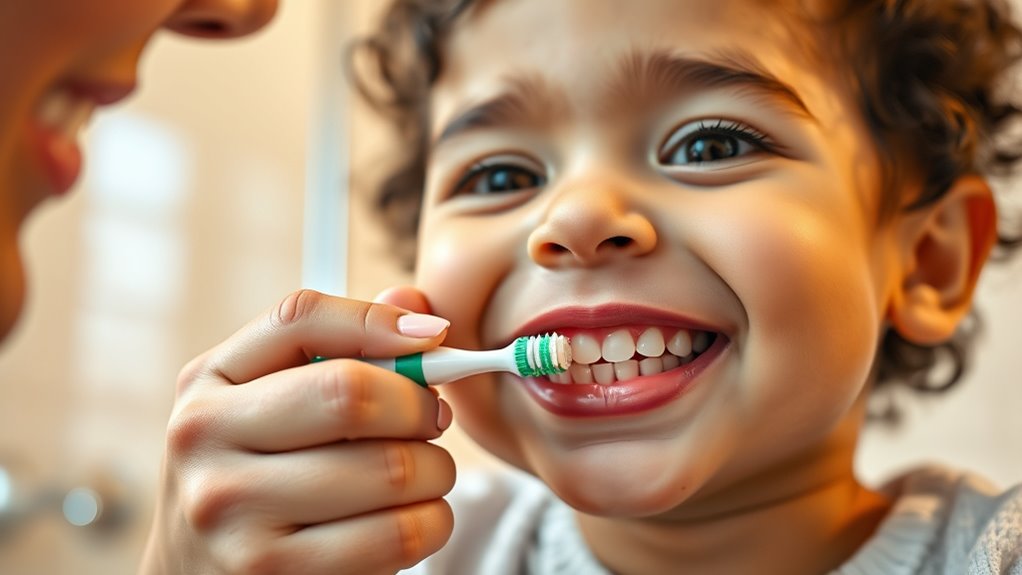
Starting dental care early is essential for your baby’s oral health. Even before their first tooth comes in, you should gently wipe your baby’s gums with a damp cloth or gauze to remove bacteria and promote healthy development. Snacks – Mad Tasting is also a good way to introduce your child to flavorful and healthy options as they grow. Once the first tooth starts to emerge, use a small, soft infant toothbrush with just water to keep their teeth and gums clean. Early dental care helps establish good habits and prevents plaque buildup that could lead to cavities. It’s also important to consult your dentist about fluoride use and suitable toothpaste options for your baby’s age. Taking these steps guarantees that your baby’s teeth start healthy and stay that way, laying a solid foundation for lifelong oral health.
Establishing Brushing and Flossing Routines
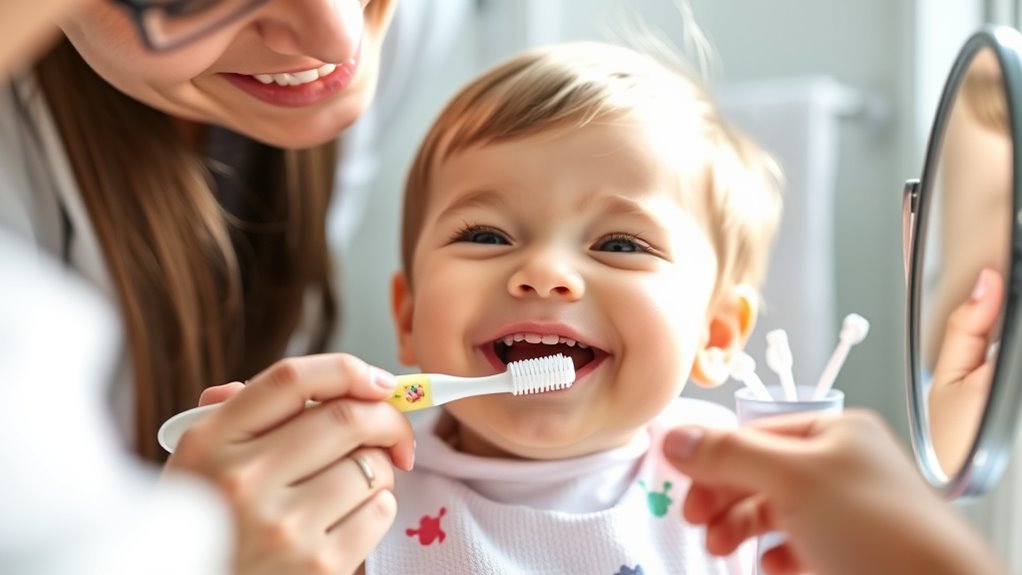
Once your child’s first tooth appears, establishing a consistent brushing and flossing routine helps keep their teeth healthy. Use a soft infant toothbrush and a small amount of fluoride toothpaste, and teach your child to spit out the toothpaste around age 2. Supervise their brushing to ensure they’re practicing good technique and covering all tooth surfaces. Floss between teeth as soon as they touch to remove debris and plaque buildup, promoting thorough oral hygiene. Make brushing twice daily for at least two minutes a habit, gradually increasing your child’s independence over time. Establishing a routine now sets the foundation for lifelong good dental habits and healthy teeth. Proper dental hygiene can prevent future oral health issues and instill good habits early. Additionally, incorporating routine dental checkups can help monitor your child’s oral development and catch problems early. Regular oral examinations also allow your dentist to assess your child’s tooth development, ensuring proper alignment and growth. Developing early dental care habits now can significantly reduce the risk of cavities and other dental problems later.
Preventing Tooth Decay and Cavities
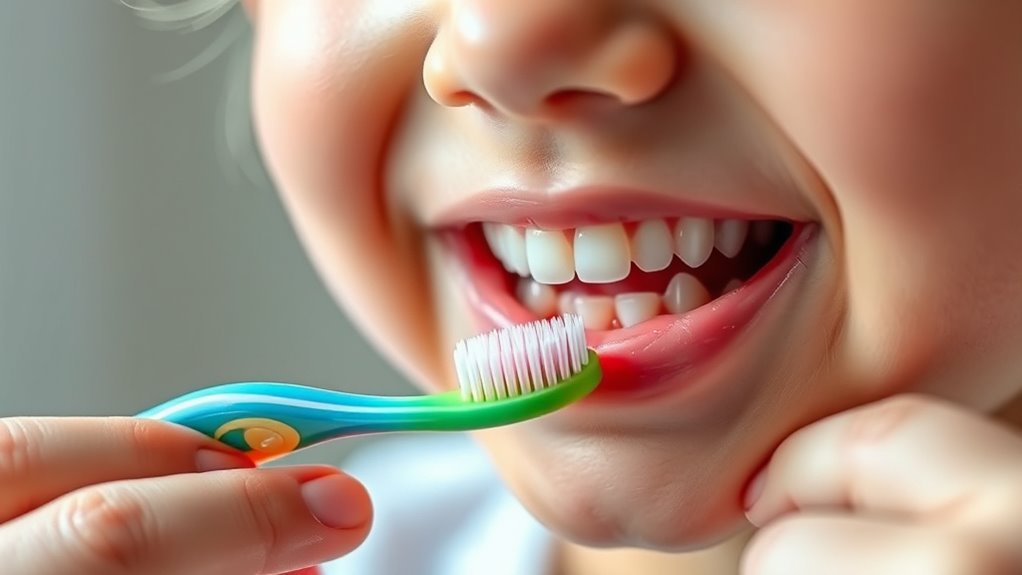
To keep your child’s teeth healthy, it’s important to limit early sugar exposure from foods and drinks, especially sugary snacks and beverages. Adopting proper oral hygiene habits like brushing with fluoride toothpaste and flossing helps remove harmful plaque. Regular dental visits and avoiding frequent snacking also protect against cavities and strengthen their teeth. Being aware of the importance of preventing tooth decay can guide you in making better oral health choices for your child. Additionally, understanding the role of AI-driven security systems can help you stay informed about emerging threats to safeguard your child’s digital safety. Proper hygiene practices are essential in maintaining overall dental health and preventing issues before they develop, especially when considering the costs of dental care that can add up over time. Incorporating performance tuning principles into your child’s dental routines—such as using the right tools and techniques—can optimize their oral health effectively.
Early Sugar Exposure Risks
Did you know that early exposure to sugary foods and drinks can substantially increase your child’s risk of tooth decay? When baby teeth are exposed to sugar, acids form quickly, leading to cavities if hygiene isn’t maintained.
Prolonged contact with sugary liquids like juice, milk, or formula, especially if your child falls asleep with a bottle, worsens the risk. Sugary snacks, dried fruits, candies, and sweetened treats produce acids that erode enamel within minutes.
Introducing a sippy cup with water or plain milk around 6 months can help reduce sugar exposure and protect dental health.
- Limiting sugary drinks and snacks between meals minimizes harmful acid buildup.
- Dipping pacifiers or bottles in jam or honey considerably raises cavity risk.
- Shortening the infant diet’s sugar content supports healthier baby teeth.
- Preventing excessive sugar contact preserves enamel integrity.
Proper Oral Hygiene Habits
Establishing proper oral hygiene habits early on is essential for preventing tooth decay and cavities in your child’s baby teeth. You should begin by gently brushing your child’s teeth twice daily with a small amount of fluoride toothpaste, using a soft-bristled infant toothbrush. This helps remove plaque and reduces the risk of cavities. Once your child’s teeth touch, introduce flossing to remove food debris between teeth and further protect their dental care. Around age 2, teach them to spit out the toothpaste to promote good oral hygiene habits. In addition to brushing and flossing, incorporating remote hackathons can inspire innovative ways for dental professionals to develop new oral health tools or educational programs for children. Incorporating dental health education can empower children and parents alike to maintain consistent habits. Incorporate routine cleaning of gums before teeth emerge to establish a healthy foundation. Scheduling regular dental visits from age one allows professionals to monitor your child’s oral health and offer personalized cavity prevention strategies. Building a consistent oral hygiene routine helps instill lifelong habits that support overall dental health. Additionally, understanding the importance of spiritual guidance can motivate parents to reinforce positive health behaviors through encouragement and education. Regularly updating your knowledge on divorce guidance can also help parents navigate the stresses related to family health transitions and ensure children maintain their well-being.
Transitioning From Bottles to Cups
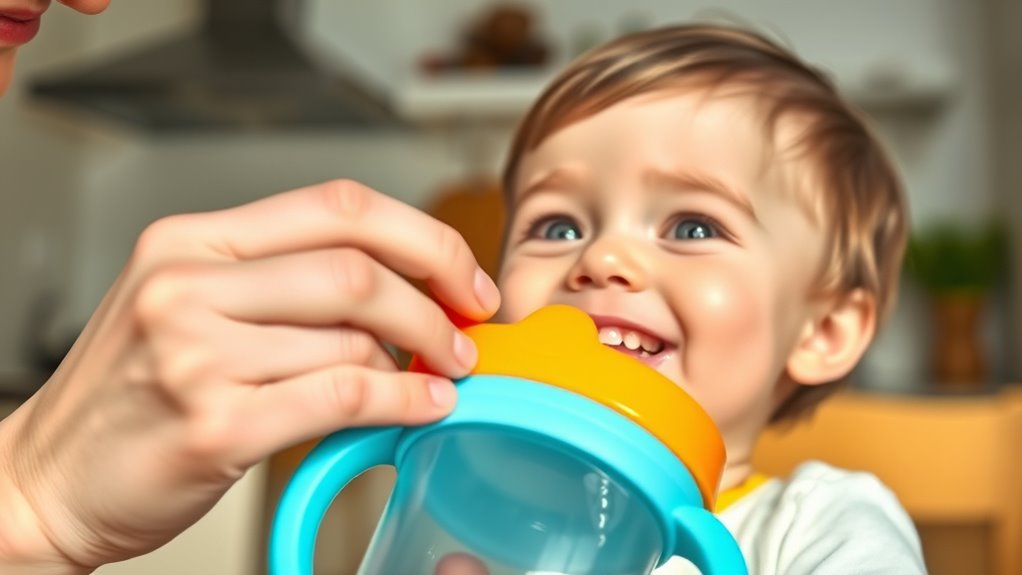
Starting around 6 months, you can introduce a sippy cup with a straw or hard spout to encourage your child’s independence with drinking. The goal is to gradually shift from bottles to cups, aiming for a full switch by 12 months to reduce decay caused by prolonged liquid contact with teeth.
Limit bottles containing juice, formula, or milk to mealtimes, as sugars in these drinks can promote cavities. Encourage water between meals and avoid sugary drinks in cups to protect your child’s developing teeth.
Supporting early habits of self-feeding with cups promotes better oral hygiene and reduces cavity risk. This transition helps establish healthier drinking habits early on and minimizes exposure to harmful sugars.
- Promote independence with a suitable cup type
- Limit sugary liquids to mealtimes
- Encourage water between meals
- Foster early self-feeding habits
Managing Teething and Discomfort
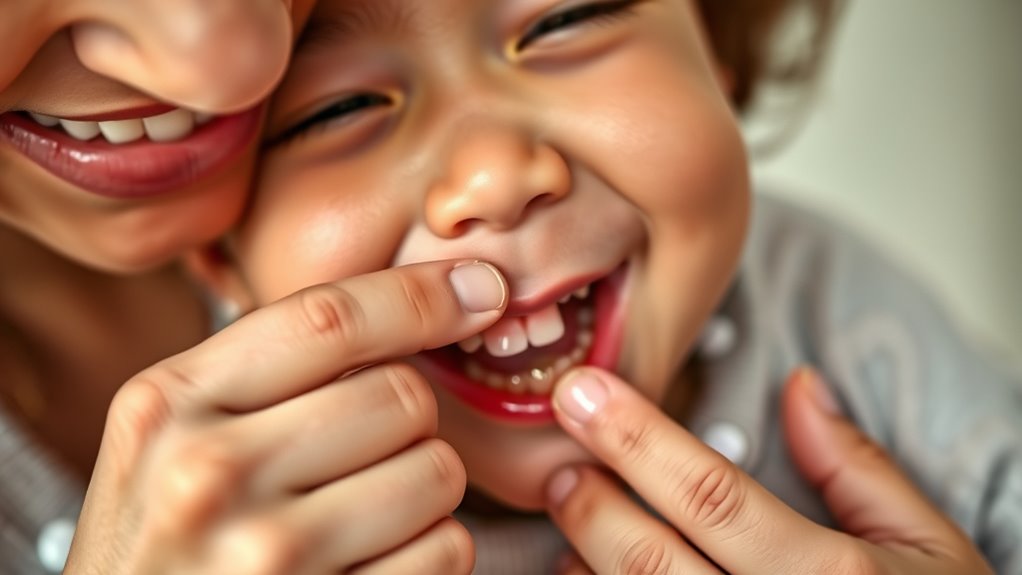
Teething can be a challenging time for both you and your baby, but there are simple ways to soothe their discomfort. To help with teething, gently rub your baby’s gums with a clean finger, a chilled spoon, or moist gauze. This can provide immediate relief and comfort. Introducing a safe sleep environment with a firm mattress and no loose bedding can also help keep your baby comfortable during this period. Offering safe, solid rubber teething rings or cold, damp washcloths can help soothe swollen gums and reduce swelling. Avoid liquid-filled or plastic teething toys, as they might break or cause sharp edges, so always supervise your little one with teething aids. Ensuring that your baby has a comfortable and hygienic environment is crucial for overall well-being during teething. Keep an eye out for signs like drooling, fussiness, or swollen gums, and use these cues to comfort your baby. If your baby shows persistent irritability or other symptoms like fever or diarrhea, consult a pediatrician.
Scheduling and Preparing for Dental Visits
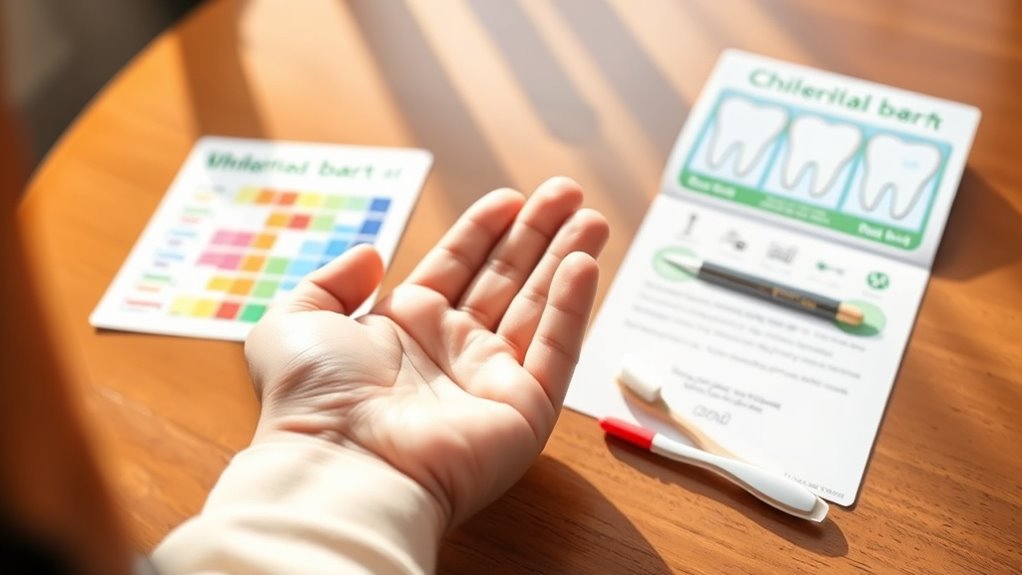
Scheduling your child’s first dental visit by their first birthday or when the first tooth erupts helps set a foundation for good oral health. Prepare your child by explaining what to expect using positive words and bringing familiar comfort items. Choosing a skilled pediatric dentist and keeping records ready makes visits smoother and more effective. You may also consider using age-appropriate dental products to support their oral health from the start. Being aware of Self Watering Plant Pots can help you understand consistent care routines, similar to maintaining your child’s dental hygiene. Additionally, understanding the importance of dental environment can encourage proper care and a positive experience for your child. Paying attention to nutritional value and limiting sugary foods further promotes healthy teeth development. Incorporating floral arrangements into your home can create a calming atmosphere that benefits your child’s overall well-being.
Timing of First Visit
The American Academy of Pediatrics recommends that you take your child for their first dental visit by their first birthday or within six months of their first tooth emerging. Early visits allow you to spot potential issues, guide proper oral hygiene, and establish a dental home. Preparing your child for their dental appointment by speaking positively about the experience can ease anxiety and encourage cooperation. During the visit, the dentist can address questions about teething, diet, and habits like thumb sucking, helping you prevent tooth decay early on. Regular check-ups every six months after the first visit are essential for monitoring development and maintaining oral health. Additionally, understanding dental health promotion strategies can help create a positive outlook on dental care from an early age. – Schedule the first dental visit promptly to set a foundation for lifelong oral health – Focus on early visits to prevent tooth decay and promote good habits – Use positive language to prepare your child for the dental appointment – Ask questions about teething, diet, and habits during the visit
Preparing Your Child
To guarantee your child has a positive experience at their dental visit, start by explaining what’ll happen in simple, reassuring terms. Tell your child that the dentist will check their baby tooth and help keep their first baby teeth healthy. Mention that the visit is quick and gentle, and that the dentist will count their teeth come, just like when you brush your teeth at home. Using calming music therapy techniques can also help reduce any anxiety during the appointment. Preparing your child can help reduce any worries about the first baby dental visit. Bring their dental records and any medical information to ensure thorough care. Choose a friendly pediatric dentist who knows how to make your child comfortable. Regular check-ups every six months help monitor their child’s teeth and keep their smile bright as their teeth come in. Additionally, creating a calm and inviting environment can make the experience more positive and comfortable, especially when you choose a dental office that emphasizes child-friendly dental care. Recognizing the importance of dental health education can also foster good oral hygiene habits from an early age. Understanding that creative practice can help children develop better routines and reduce fears related to dental visits is also beneficial.
Promoting Healthy Eating to Protect Teeth
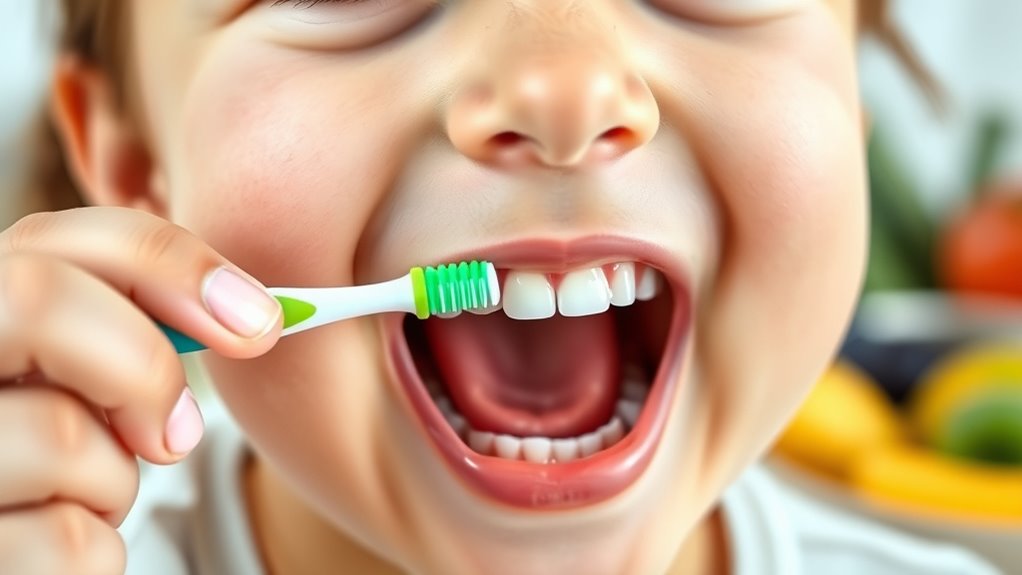
Promoting healthy eating habits is essential for protecting your child’s developing baby teeth. Limiting sugary foods and drinks, like candies, desserts, and sweetened beverages, helps prevent cavity formation and tooth decay.
Instead, offer healthy snacks such as fruits, vegetables, and cheese, which supply crucial nutrients while reducing exposure to cavity-causing sugars. Diluting fruit juices to no more than 150ml daily and serving them only at mealtimes minimizes acid attacks on tooth enamel. Incorporating proper oral hygiene practices into daily routines further safeguards your child’s teeth from decay.
Choosing water with fluoride as the main drink supports remineralization of teeth and guards against decay. Additionally, avoid dipping pacifiers or bottles in jam or honey, as this increases sugar contact with your child’s teeth, heightening cavity risks. Using wall organization systems can help keep dental tools and supplies orderly and accessible for daily care routines.
- Prioritize nutritious snacks over sugary treats
- Limit fruit juice intake to mealtimes and small amounts
- Use fluoride water to strengthen baby teeth
- Minimize sugar contact from pacifiers and bottles
- Understanding child oral health can help guide better dietary choices and prevent future dental issues.
Frequently Asked Questions
How Do I Take Care of My Baby’s Teeth?
You want to know how to take care of your baby’s teeth. Start by gently cleaning their gums with a damp cloth or gauze from birth.
Once their first tooth appears, switch to a soft toothbrush with a tiny smear of fluoride toothpaste and brush twice daily.
As they grow, floss between teeth, schedule their first dental visit by age one, and keep sugary foods and drinks to a minimum.
What Age Do You Start Cleaning Baby’s Teeth?
Imagine laying the foundation for a healthy smile—when do you start cleaning your baby’s teeth? You should begin as early as birth by gently wiping their gums with a soft, damp cloth or gauze daily.
Once the first tooth erupts around 6 months, switch to a small infant toothbrush with a tiny amount of fluoride toothpaste. Starting early helps prevent decay and sets the stage for lifelong good oral habits.
How Can I Prevent My Child’s Teeth From Decaying?
To prevent your child’s teeth from decaying, limit sugary foods and drinks, especially sticky candies and sugary beverages. Use fluoride toothpaste twice daily and make sure they brush thoroughly.
Avoid putting them to bed with a bottle of milk, juice, or formula to prevent prolonged sugar contact.
Encourage water intake between meals to wash away food and acids.
Regular dental visits starting at age one help catch issues early and provide preventive treatments.
How to Preserve Your Child’s First Tooth?
To preserve your child’s first tooth, start by cleaning their gums gently with a damp cloth before teeth appear.
Once the tooth erupts, brush with a soft toothbrush and a tiny smear of fluoride toothpaste twice daily.
Avoid sugary foods and drinks, and limit prolonged bottle use.
Schedule their first dental visit by their first birthday, and maintain consistent oral hygiene routines to prevent decay and guarantee healthy development.
Conclusion
By following these simple steps, you’ll turn your child’s tiny teeth into a fortress of health, guarding against cavities and decay like an unstoppable superhero. With your dedication, those little teeth will shine brighter than stars and stay strong enough to chew through anything life throws their way. So keep up the good work, because your efforts today could save your child from a lifetime of dental drama—your future self will thank you forever!
